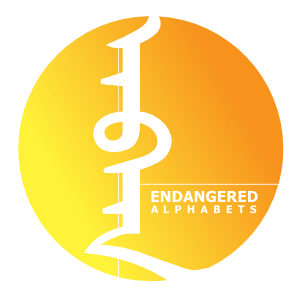Since 2009, the Endangered Alphabets Project, a federal 501c3 non-profit based in Vermont, has been the world leader in identifying, researching, and promoting both endangered and emerging scripts, and in pioneering the cultural importance of scripts and the study of script loss and discovery.
It is no exaggeration to say that this entire field did not exist before the launch of the Endangered Alphabets, so the impact of the work has involved not only support for minority cultures in the developing world but the equally challenging task of changing perspectives, attitudes and values in the privileged world.
Why is this work both important and urgent?
In countries all over the world, members of indigenous cultures have their own spoken and written languages — languages they have developed to express their own beliefs, their own experiences, and their understanding of their world. What they have collectively written in those languages is the record of their cultural identity: spiritual texts, historical documents, letters between family members, legal documents, medicinal properties of local plants.
In scores of countries, though, those minority languages are unofficial, suppressed, ignored or even illegal. As a result, adults have to speak a second or even a third language to get social services or deal with the law. Children sit through classes listening to teachers they can barely understand. All ages are mocked for being “stupid” or “primitive” for not speaking the majority language from birth.
Denying members of a minority culture the right to read, write and speak in their mother tongue defines them as inferior and unimportant, and leaves them vulnerable, marginalized, and open to abuse. The extent and quality of education go down, while levels of homelessness and incarceration, and even suicide go up. Such cultures often face economic, healthcare, environmental and criminal justice system oppression.
Researching and promoting endangered alphabets is a matter of human rights; it is a matter of public health; in some countries it is literally a matter of life and death.
